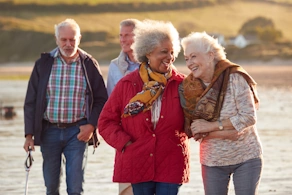The Benefits of Independent Living for Seniors: Health, Freedom, and Well-being
The older people become, the more independent they want to be. As part of independent living, a lifestyle many seniors pursue, housing is not the essence of the matter; being linked and afforded personal choice are crucially intrinsic to health and quality of life.
Independent living for seniors stretches beyond having a roof over one's head. They find the ideals of independence, dignity, and self-actualization on which seniors can live a good life.
This lifestyle allows seniors to have control over their daily routine, make decisions based on their own free will and choice, and create more development of self and hobbies to complete a full, meaningful retirement.
By giving precedence to independence and choice, living independently enables the elderly to live lives that are secure, purposeful, and full of satisfaction.
Life Assure Product Quiz
Take our 30 second quiz and discover which Life Assure medical alert device is the right fit for you or a loved ones.
Life Assure Product Quiz
Take our 30 second quiz and discover which Life Assure medical alert device is the right fit for you or a loved ones.
Benefits of Independent Living for Seniors

Here are some of the major advantages of independent living for the elderly:
1. Physical Health and Wellness
The greatest merit of independent living is how it affects physical health. The active style of living within the community helps develop and maintain mobility and the general well-being of the elderly.
Independent living communities offer the convenience of a swimming pool and walking trails with exercise classes for residents to be able to live healthy and active lives.
Activities reduce the chances of older adults developing chronic diseases, such as heart disease, diabetes, and osteoporosis. It offers a balance to reduce injury from falling, which is one of the major causes of injury in the elderly, just by being engaged with others and around.
Independent living also lends itself to a much more organized environment physically, which helps to ensure better mental health.
Regular exercise and socialization reduce stress, anxiety, and depression. Keeping the body active and socially engaged promotes clear thinking for overall mental clarity and a more satisfactory lifestyle.
2. Mental and Emotional Health
Independent living also largely impacts mental and emotional health. Social isolation and loneliness are key fears among most older people, especially those living alone. It can further contribute to depression, anxiety, and decreased cognitive levels.
Independent living communities provide opportunities for social interaction and mutual interaction through shared dining, common activities, and shared spaces. Social engagement is significant in the maintenance of healthful cognitive functioning and emotional control.
Research supports the importance of community living in seniors, as staying socially active reduce risks of developing dementia in old age and improve conditions by reversing other cognitive disabilities.
Independent living can foster a sense of meaningfulness and belonging through involvement in activities and volunteer opportunities within the community that are important to the resident.
Active involvement wrestles with feelings of helplessness or uselessness but enhances self-esteem and satisfaction with life. Contributing to the community might give new meaning and satisfaction in life to the aging person.
3. Freedom and Independence
A sense of pride and self-satisfaction is found in many seniors to make their choices and living as they desire.
Independent community living promotes control over everything that dictates their day, from choosing what to eat to the people they wish to spend their time with to engage in various activities and socializing.
This gives them a sense of purpose and self-worth cardinal for sound mental and emotional health.
This is important because a resident is likely to remain satisfied and happy since they can still maintain their hobbies, interests, and the kind of lifestyle that gives meaning to their life in independent living communities.
The safety of one's elderly loved one is a priority for any family. At the very least, independent living facilities usually provide safety features that include gated access, emergency call systems, and 24-hour staff.
Many measures are put in place to ensure that the residents are independent but can receive assistance whenever an emergency occurs.
In trying to maintain this delicate balance, seniors achieve the freedom to be carefree in their enjoyment of freedom without worrying about their well-being; this creates peace of mind for the resident and family members.
4. Less Stress and Greater Financial Freedom
Independent living removes the everyday worries connected with owning a house, like maintenance, mowing the lawn, or repairing, which may become unbearable in advanced years.
These are usually well-managed in the communities so that the seniors can enjoy retirement at their best time. Independent living also ensures predictability in relation to money matters by including in one bundle price all housing, utilities, meals, and community amenities.
This way, it allows a senior to manage his or her own finances much better; hence, free from stress and ascertains secure retirement days.
Moreover, independent living for seniors can often provide a sense of community with endless socialization opportunities, which alone might set psychological well-being in the right direction.
Thanks to organized activities, events, and common areas, seniors may easily and effortlessly get acquainted and remain socially active. Communicativeness combats not only isolation or loneliness but also adds to a more creative, vivid, and full retirement life.
5. Social engagement and community
Socialization in these independent living communities enhances friendship and mutual support among residents.
Group activities, clubs, and other events provide the opportunity for senior citizens to share interests and further develop a support network that helps in coping with some of the challenges associated with aging.
Being part of a community comprising peers at a similar life stage offers emotional support and companionship in case one becomes widowed or the family lives far away.
Independent living is cost-effective in the long run and leads to continuity in care. Independent living can also avoid, or at least delay, the need for more advanced care by keeping the elderly active, socially involved, and mentally stimulated.
Many independent living communities can also offer a continuum of care options if their residents require additional care in the near future. Continuum helps to maintain relationships and a sense of security due to the maintenance of routines, very critical during times of change.
Conclusion
Other added advantages of independent living for seniors include an increase in physical well-being. This further reflects an enhancement in their mental well-being, all in one comfortable, homely surrounding.
This creates a very supportive environment that enables seniors to keep their dignity and independence in their living and quality of life as they age.












 Get Help With The Push Of
A Button
Get Help With The Push Of
A Button















